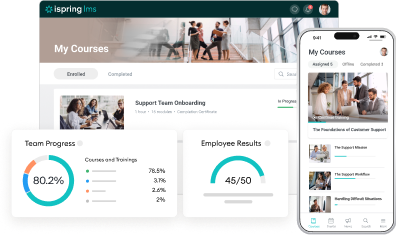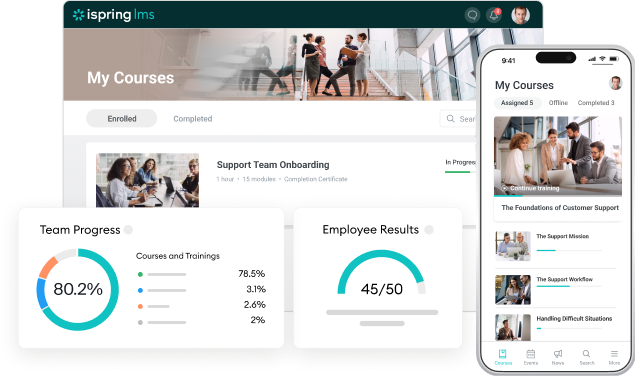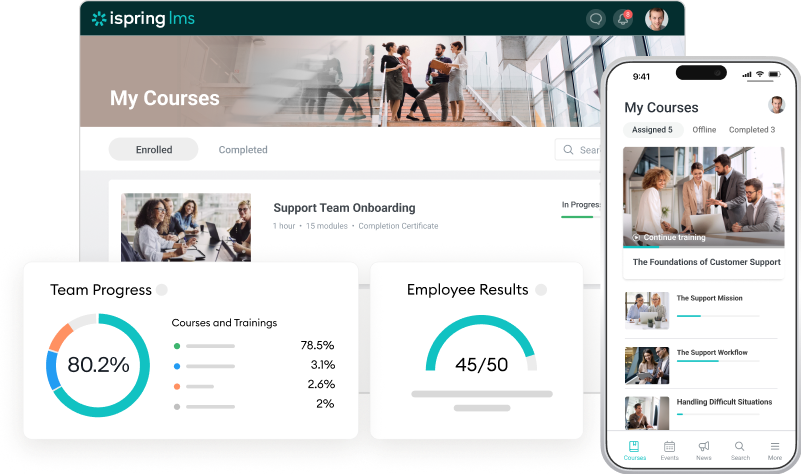The 25 Best Online Learning Collaboration Tools

A social learning theorist walks into a bar and sees a behaviorist. One believes we learn by watching others; the other by repeating behaviors with reinforcement. What will they argue about? They disagree on a lot of issues — and collaboration will probably be one of them.
But in today’s learning environments, collaboration is a proven driver of engagement, creativity, and deeper understanding. When students collaborate, they also learn faster and retain more. That’s why it should be at the heart of any effective training program. And today’s learning technologies offer powerful ways to collaborate.
To help you choose the right tools, we’ve rounded up the 25 best ones for online learning, including plenty of free options. In this article, we cover collaborative authoring tools, solutions for virtual classroom activities, and platforms that enable you to share your ideas. We also offer sets of content organization tools, productivity boosters, and LMSs for collaboration.
Tools for Collaborative Authoring
Collaborative authoring tools are essential for both educators working in large departments and teachers sharing the same class. They must facilitate course creation while offering many features that enhance collective expertise. Here are our top picks and alternatives.
- First Prize in the category: iSpring Suite AI
Alternatives: - Articulate 360
- H5P
- Udutu
- Easygenerator
Let’s take a closer look at each one.
1. iSpring Suite AI: Create feature-rich courses quickly and easily

Are you a PowerPoint fan? If you answered yes, you’ll come to love one of the best online collaborative tools, iSpring Suite AI. This is a PowerPoint add-on that boasts a huge range of design features for creating engaging eLearning content.
Authors and reviewers can co-create and co-edit content in real time. Its built-in AI assistant helps build course outlines, create interactive quizzes, and generate training content on any topic. This platform also pairs perfectly with iSpring LMS, a collaborative LMS, to share projects, track performance, and receive feedback.
Cost: starts at $1,290 USD per author/year; free 14-day trial.
2. Articulate 360: Design interactive learning materials with colleagues

For those who want separate course authoring software, there’s a set of collaborative tools called Articulate 360. The interface and capabilities look similar to PowerPoint and are simple and easy to use. The solution works great as a collaborative learning tool for beginners. It allows teams to contribute to digital educational content and receive feedback on its implementation.
Cost: from $1,499 USD per author/year.
3. H5P: Collaborative learning design that embeds in your website

If you need to create training content right on your website, try H5P. The solution is open-source and works in a web browser or can be integrated with an LMS through LTI. It’s a great authoring tool for creating websites for collaborative learning.
Cost: from $79 USD per 3 users/month; free 30-day trial.
Too much to read? Get a summary from AI
4. Udutu: Web-based authoring for unlimited users

Udutu is a web-based authoring tool for designing interactive lessons and courses. It’s a free tool that allows an unlimited number of users to collaborate on a project in real time. Offering all standard capabilities, such as course customization and PowerPoint-to-SCORM conversion, it’s perfect for beginners.
Cost: free for Udutu LMS users, from $USD 199 per license/month for open publishing license.
5. Easygenerator: Simple drag-and-drop authoring

Easygenerator is on this list as an easy-to-use option, as the name implies. It’s a good fit for those looking for an online collaboration teaching and collaborative learning tool that won’t take much time to master. This authoring tool allows for an unlimited number of creators and can integrate with most popular LMSs.
Cost: $116 USD per author/month (Pro); $582 USD per author/month (Team); free 14-day trial.
Collaborative Tools for Virtual Classroom Activities
Trainers and teachers also need tools to bring learners together for interactive online activities. Virtual classrooms provide extensive opportunities for social and collaborative learning, so even the shyest learners will get a chance to participate actively in the collaborative process. With the student collaboration tools we’ve selected, you’ll have the entire class engaged.
- First Prize in the category: Microsoft OneNote
Alternatives: - Kahoot!
- Colltrain
- Pear Deck
See their detailed description below.
1. Microsoft OneNote: Complete assignments, work on files, and create interactive lessons

What about detailed lesson planning? Microsoft OneNote gives teachers a great range of options when planning lessons that maximize the use of interactive elements. OneNote works like a smart notebook and collaborative learning software to share your work in Microsoft Teams or other tools.
Cost: the app is free; the desktop version is included in the paid MS Office suite.
2. Kahoot! Vibrant quizzes that get everyone involved

Kahoot is one of the most popular, accessible, and all-around impressive quiz tools for education. Students join the quiz via a code on their own devices and can work individually or in pairs. Kahoot is simple to use but visually impressive, making it a go-to online collaborative learning platform.
Cost: $10 USD per host/month (Starter); $25 USD per host/month (Presenter); $49 USD per host/month (360 Pro); $59 USD per host/month (360 Pro Max).
3. Colltrain: Implement playful collaborative learning

Did you know that games increase learner engagement? Colltrain is a simple classroom collaborative learning platform that utilizes gamification. This learning tool is a great option for schools and is also popular for virtual training across the corporate world. Educational games teach learners to work in teams, achieve common goals, and grow professionally.
Cost: free (Hobby); $24 per user/month (Standard); $39 per user/month (Facilitator Plus).
4. Pear Deck: Lead every student to active learning

Pear Deck is another interactive collaborative learning tool that focuses on tracking student progress and gamification. The platform’s unique features boost interactivity to get students of all abilities to participate in lessons with the flexible templates provided. And instant feedback is collected for later review.
Cost: free (Basic); from $149 USD per user/year (Teacher Premium).
Collaborative Tools for Sharing Ideas
Sharing ideas might be the most important part of collaborative learning, especially for cohort-based training. Learners who share the same training goals solve tasks faster, remember more, and establish great working relationships. With the learning platforms and remote working tools listed below, you’ll provide opportunities to share learners’ ideas whenever they wish.
- First Prize in the category: ConceptBoard
Alternatives: - Flipgrid
- InsertLearning
- Figma
- Book Creator
- Soundtrap Edu
We’ve checked them out and described them below.
1. ConceptBoard: Think together and draw on a whiteboard

Do you prefer simple whiteboards but still want to work online? ConceptBoard is a collaborative note-taking app for displaying ideas in a visual space between users. The digital canvas, screen sharing, and video chat make this one of the most useful collaborative learning platforms.
Cost: from $6 USD per user/month (Starter); from $12 USD per user/month (Advanced). Free 30-day trial.
2. Flipgrid: Get video feedback from your students

Sometimes, a simple video recording and sharing tool works better than other feedback methods. Flipgrid App is a digital collaborative learning tool with only one collaborative feature that gets your students to view, react to, and share ideas. Flipgrid also provides a stream of meaningful reviews and discussions on all your learning topics.
Cost: free
3. InsertLearning: Review texts together and complement them with multimedia

InsertLearning is a Chrome extension that allows you to nurture discussions on interesting content anywhere on the web. The app works on any site: just open the extension and enhance student learning by annotating, inserting questions, and more. It’s definitely more engaging than traditional Google Docs.
Cost: free for students; $19.99 per teacher/month (Individual Teacher).
4. Figma: Display design skills and share novel ideas

Figma is a team-friendly design platform for creating interfaces. It can be used for almost everything that’s related to design, from creating UX/UI mockups to building maps and sharing ideas. Although this looks somewhat complex, Figma provides a number of super simple templates for educational use. The tool is great for collaborative learning: people can share, discuss, preview, and approve designs and ideas in real time.
Cost: free (Starter); from $3.5 USD per user/month (Professional); from $6 USD per user/month (Organization/Enterprise).
5. Book Creator: Share insights on interactive books

Book Creator is a great way to engage students and get them to share ideas and practice creative writing. Learners share their subject matter expertise in booklets and stories with an extensive multimedia toolset, hand-picked fonts, and a library of templates. This Chrome extension is perfect for literary projects and allows collaboration on various projects.
Cost: free (Starter, individual); $13 USD per teacher/month (Premium).
6. Soundtrap Edu: Record lessons and podcasts together

Creating podcasts is much easier with Soundtrap Edu. Using this tool, you can record lessons or sound bites for collaborative learning purposes. Recording entire conversations and podcasts for students to listen to later is also available.
Cost: from $14.15 USD per user/month; free 1-month trial.
Collaborative Tools for Content Organization
Organizing and compiling your resources is a must to enhance learning because it improves focus and facilitates collaboration. And it can be improved even further if teachers and learners have mutual access to such resources. Look at these tools that have been created to facilitate collaborative learning.
Here are the details.
1. Padlet: Gather web content

Collect all insights from your learners with a single discussion board. Padlet is a digital bulletin board that allows students to work on their collaboration skills by contributing to the class. Contributions can be documents, links, videos, and images that will be used in class activities or lesson plans.
Cost: limited free version; from $11.60 USD per user/month (Gold); from $1,000/year (Schools, up to 10 teachers).
2. Diigo: Gather web content, annotate it, and share it

Diigo is another collaborative learning tool that allows group members to collate online resources. It also lets users annotate and highlight information for better communication. The tool is available as a browser extension or as a mobile app.
Cost: free by default and for educators; other versions start at $5 per user/month.
3. Zotero: Gather sources for research and share them

Another insight collecting tool, Zotero focuses on helping you collect and share research sources and papers from all over the web. This collaborative learning platform is a perfect solution for creating a bibliography for a project with multiple contributors.
Cost: free (up to 300MB), from $1.67 USD per month for more space.
4. Quizlet: Collect it all in convenient flashcards

Quizlet allows you and your learners to turn all your learning materials into convenient flashcards and practice tests. With this tool, you can study your own content, check out your co-learners’ flashcard lists, and share your own. You can also collaborate to create them together!
Cost: free version; QuizletPlus starts at $3.5 per user/month.
Collaborative Tools That Boost Productivity
Are your working plans always well-organized? If you answered yes, that’s great! But what if work is planned for the team, and everyone needs to be able to see what’s going on. Collaborative learning productivity tools were built to make this process easy. And we found the two best options:
- First Prize in the category: Google Workspace
Alternatives: - Notion
Also read → Best Interactive Presentation Software
1. Google Workspace: A project management tool for all your productivity needs

Google Workspace includes a calendar, a drive for sharing files, and equivalents of Microsoft Office applications. Google Docs, Google Slides, and Google Classroom — everything available in one place. These collaborative tools are all cloud-based and can be shared and edited in real time by anyone with access.
Cost: free
2. Notion: A clean and sophisticated platform packed with features

Many organizations use Notion as an ergonomic solution that, besides collaborative learning, can help plan, design, and work. Notion can serve as a powerful productivity tool that saves time and keeps people organized. With online tools like this, you can arrange your team’s tasks, track each team member’s efficiency, and share feedback right in the actual tasks.
Cost: free (basic); $12 USD per member/month (Plus); $24 USD per member/month (Business).
LMSs for Collaboration
Learning management systems are an essential tool for online course delivery and progress tracking. To share and display educational content efficiently, they must support collaboration. Here are the best LMSs that allow co-creation, team learning, and more.
- First Prize in the category: iSpring LMS
Alternatives: - 360Learning
- Docebo
- Schoology
Read on to learn more.
1. iSpring LMS: A reliable LMS for onboarding, upskilling, and certifying your teams

The iSpring LMS platform effortlessly balances ease of use with high-quality collaborative learning experiences. Students engage with a range of media and interactions, while educators and SMEs can all track and monitor learning progress. With iSpring LMS, you can easily share your content online and host webinars and virtual classrooms for teamwork and collaboration. Moreover, trainers and admins can create group chats for active discussions, while learners can review courses and ask instructors direct questions about the course content.
Cost: starts at $4.46 per user/month; free 30-day trial.
2. 360Learning: Manage collaborative learning with confidence

For simple training programs, there is 360Learning — a cloud-based tool for collaborative learning. The platform allows team members to create and edit courses, assign roles to members, and invite external users to review.
Cost: from $8 per user/month.
3. Docebo: Streamline your learning management with user-generated resources

Docebo allows you to create user-generated materials, implement them into your designs, and deliver them to your learners. It’s on the cutting edge with its AI integration, which can be used to offer personalized training to each learner. This is a good way for enterprises to enhance their trainees’ opportunities to learn while growing the company’s reputation.
Cost: upon request
4. Schoology: Help your learners work together with custom learning groups

Schoology is an online collaborative learning platform tailored for schools and colleges that’s used by both teachers and students. While covering the entire standard K-12 education course (AI included), it offers college, career, and life readiness solutions. With personalized learning and talent recruitment, it works perfectly for all class sizes — from small groups to large auditoriums — as an all-in-one solution.
Cost: free for educators, from $10 USD per student/month.
Conclusion
Collaborative learning tools range from simple apps like Google Docs to full-fledged suites for every need. Either way, any tool that can increase the level of collaboration in a learning environment is worthwhile.
If your goal is to create effective team-based learning experiences with your design team, SMEs, or fellow educators, try the iSpring Suite authoring tool. Pair it with the iSpring LMS to cover everything from creating courses to delivering your content to multiple learners and assessing their results for future improvements. Try both tools for free today.







